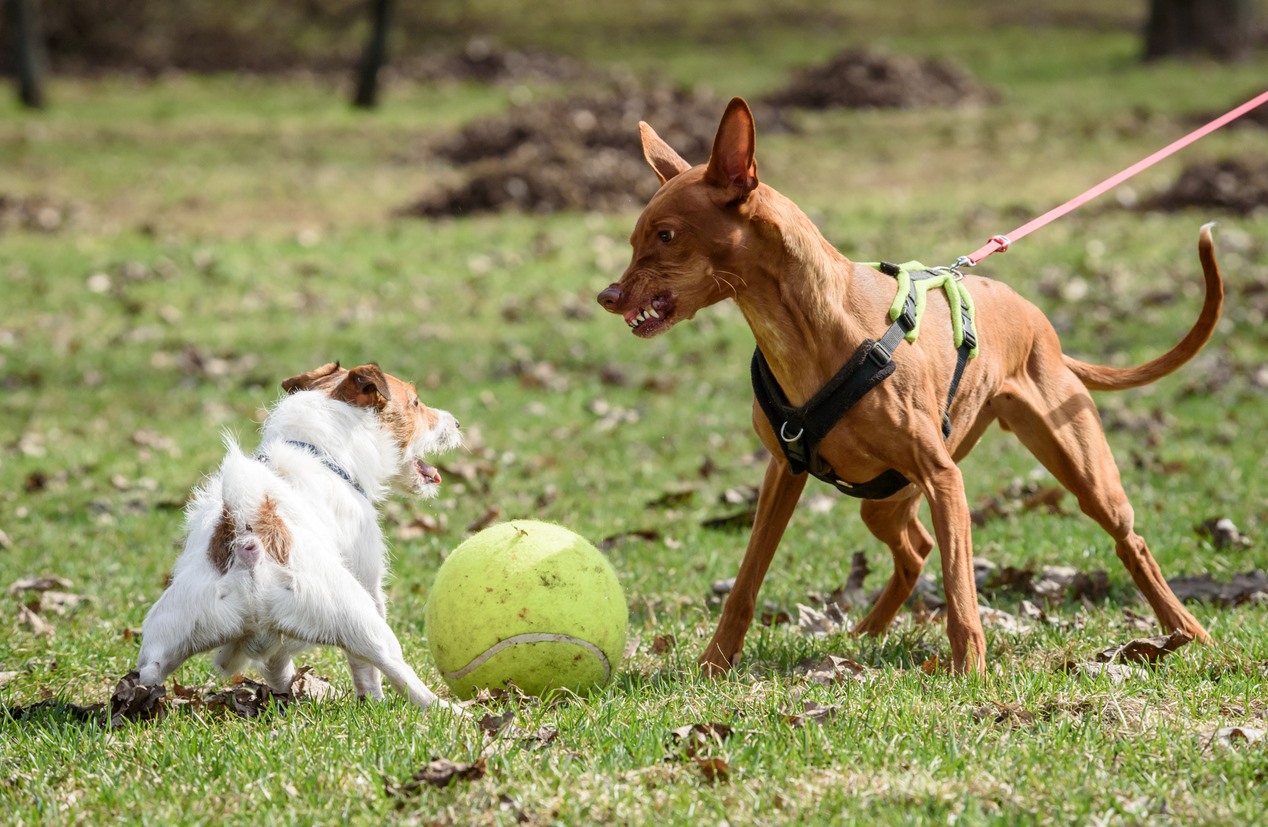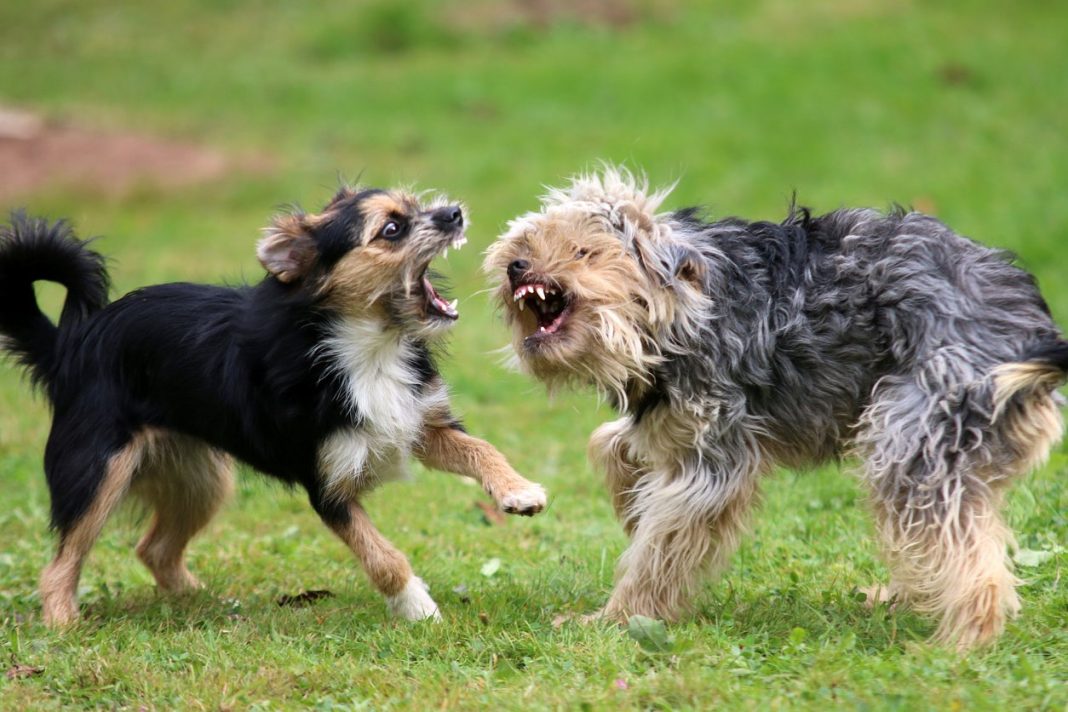As the sun was setting along the Lake Ginninderra foreshore, a blood-curdling scream rang out. Spread out on the footpath, an elderly woman grasped the lead of a medium-large dog while a man ran off holding a small dog.
Approaching the scene, people crowded around the woman to ask if she could stand, where she was going, and how they could help. Her groceries were bagged up, people offered to walk her home and call an ambulance or a loved one for help.
Around the corner, alone, the man clutched his bleeding and terrified puppy. A dropped phone, far away from his car and in shock, he sat unsure of what to do as everyone flocked to the older woman.
What to do if you see a dog attack?
An ACT Government spokesperson says in an urgent and threatening situation to call ACT Policing on triple zero (000). There is also a 24/7 operation where the community can report dog attacks via Access Canberra; dog attacks are the highest priority for response by Domestic Animal Services (DAS) rangers.
Animal welfare experts RSPCA ACT advise that it is important to ensure your own safety and not use your hands to intervene. Distract the animal from a distance, if possible, like the beeping of a car horn. If the dog were the lunge at you, it is advised to put a barrier between the two of you – a bag, rolled jacket, or whatever you can find.
If bitten, RSPCA advises to stay upright, remain still and call 000 for help. In the aftermath of an attack, it is important to provide or seek first aid treatment and report the attack to DAS.
“Experiencing or witnessing a dog attack can be very scary and traumatic. RSPCA ACT would therefore like to remind owners and members of the public who witness attacks to also seek mental help for themselves,” says Michelle Robertson, CEO of RSPCA ACT.
Back to the incident at Lake Ginninderra: Over the next hour, the facts came out. A horrified onlooker informed the small crowd that it was the woman’s dog that attacked the puppy, unprovoked and in a way that she would be surprised if the little dog survived. The owner of the attacking dog told everyone that though her pet hated other dogs, it loved people.
Concerned for the safety of the owner and the community, an ambulance and the police were called to the scene. Once the police arrived and the owner was checked over by the paramedics, the owner and her partner informed the officers that they knew the dog had issues with other dogs and shouldn’t have been out.
The man and his puppy were taken to an emergency vet where it had a gash in its chest but was expected to survive.
Since then, the large dog has been seen out in the same area without a muzzle, which was suggested by the police.
What happens if owners continue to put their dogs in the same situation?
The ACT Government spokesperson says DAS can only act after a report is made and the evidence supports regulatory action. The DAS rangers and investigators trained in dog handling gather and consider all the evidence.
“This usually involves speaking with the alleged attacking dog keeper/carer, educating them about responsible dog ownership. and determining if enforcement options are appropriate based on the situation and circumstances,” the spokesperson says.
“The ACT has the strongest dog laws in Australia. Enforcement options include a warning for minor incidents, through to infringements, control orders, and dangerous dog orders depending on the severity of the incident. Under the Act, a dog can also be destroyed where it poses an unacceptable safety risk.”

Prevention is key
The ACT Government spokesperson says that dog attacks are the result of an instinctual response such as being protective, territorial or provoked. They say all dogs have the capacity to be aggressive and dangerous if not managed appropriately and responsibly. The pet owner is solely responsible for ensuring their dog isn’t negatively impacting the community.
This looks like: always having effective control of your animal regardless of whether it is leashed, meaning you are able to prevent the dog from approaching other animals and people by command or restraints; socialisation from a young age through legitimate training and socialisation organisations; understanding your dog’s body language and how it may be perceived by another person or dog; and instantly removing your dog from a situation that is becoming aggressive.
“We also encourage Canberrans to follow the Yellow Dog initiative. The initiative is designed to bring awareness to dogs that need space. This could be because they are nervous, anxious, old, in training or recovering from surgery. If your dog needs some extra space, a yellow bandana, vest or ribbon will signal to others do not approach this dog or its owner,” the spokesperson says.
The majority of dogs in Australia don’t bite, according to Ms Robertson, but it is still important for children and adults to be educated on bite prevention and to practise responsible ownership to prevent any attacks.
“There are a number of things responsible pet owners can do, for example, always supervise your dog while they are outdoors and/or with people. Take your dog to humane, reward-based training classes. Err on the side of caution and seek help from a qualified behaviourist if needed. Continue to work on communication between you and your dog, pay attention to their body language, don’t place your dog in situations that will stress them, and protect them by controlling their environment based on their needs, personality and temperament,” she says.
Other prevention strategies advised by the RSPCA include the registration and microchipping of dogs and the desexing of nonbreeding dogs.
Who pays for treatment?
If an animal is hurt and requires veterinary care, Section 55 of the Domestic Animals Act 2000 states that the keeper of the [attacking] dog is liable to pay the person, or the owner of the animal, compensation for any loss or expense because of the attack or harassment.
For more information about dog attacks, visit City Services; for more information on animal welfare, visit RSPCA ACT.
Canberra Daily would love to hear from you about a story idea in the Canberra and surrounding region. Click here to submit a news tip.



